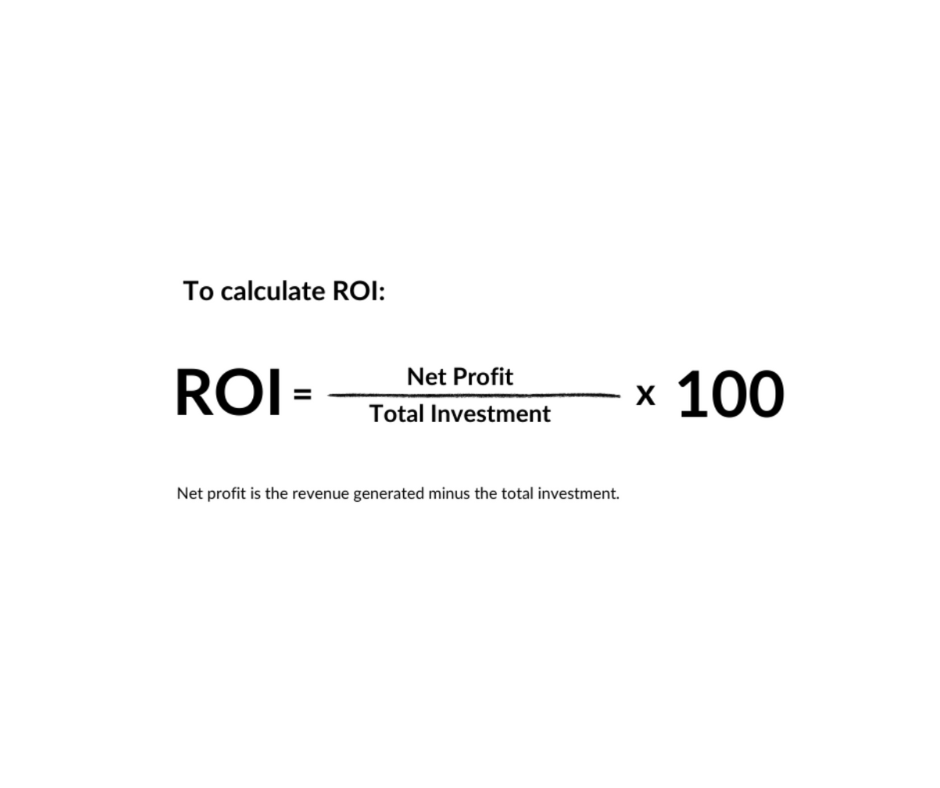Understanding the return on investment (ROI) of your marketing campaigns is vital for every business. Without it, businesses operate blindly, unaware of which strategies are driving results. Having the ability to identify high-ROI marketing campaigns can save you significant time, money, and resources by directing efforts toward effective strategies. This efficiency prevents the unnecessary or inefficient use of resources, time, money and effort on marketing tactics that do not yield results. Here’s a step-by-step guide on how to measure the ROI of your marketing campaigns.
Define Clear Objectives
Before measuring ROI, establish clear and measurable goals for your marketing campaign that are specific, measurable, achievable, relevant, and time-bound (SMART). Examples of a SMART goal is to aim to increase website traffic by 20% within three months or generate 50 new leads in a month. This approach ensures focused and purposeful efforts and provides a benchmark to measure success.
Track Your Expenses
Accurately tracking all expenses associated with your marketing campaign is crucial for comprehensive financial management. According to a study by the American Marketing Association (AMA), businesses that meticulously record both direct costs, such as advertising spend and content creation, and indirect costs, like staff time and overheads, achieve a deeper understanding of the campaign’s true cost. This comprehensive approach enables more precise ROI calculations and better budget management, leading to improved financial outcomes.
This effort also provides clarity on the financial investment required for the campaign and insight into the total resources allocated, facilitating better budget management and resource allocation. And understanding the true cost aids in assessing the feasibility and sustainability of the campaign, ensuring alignment with overall business objectives. Accurate expense tracking facilitates informed decision-making throughout the campaign lifecycle, enabling businesses to identify areas of overspending or inefficiency and optimize resources to enhance effectiveness and maximize ROI.
Measure Key Metrics
To effectively evaluate marketing campaign success, you have to identify and measure key performance indicators (KPIs) linked to campaign objectives. If you’ve built your marketing strategy already, you’ve already identified your KPIs. These KPIs can include conversion rates, click-through rates, leads generated, sign ups, account activations, customer acquisition costs, and revenue. Tracking these metrics provides valuable insights into campaign effectiveness, facilitating data-driven decision-making for performance optimization.
Utilizing analytics tools like Google Analytics, Sigma, and Amplitude is vital for gathering and analyzing KPI-related data. These tools offer comprehensive insights into campaign performance metrics allowing businesses to pinpoint trends, patterns, and improvement areas, empowering them to refine strategies and drive superior outcomes.
Calculate Revenue Generated From Campaigns
To measure ROI, track the revenue directly generated by your marketing campaign through methods like unique promotional codes, dedicated landing pages, or UTM parameters. According to a study by HubSpot, businesses that track their marketing ROI are 58% more likely to achieve higher revenue growth because it enables them to make data-driven decisions and allocate resources more effectively based on the performance of their campaigns. These tools help attribute sales to specific campaigns, demonstrating the financial impact and facilitating the evaluation of marketing effectiveness.
Incorporating UTM Parameters for Precise Tracking
To enhance tracking accuracy, consider using UTM parameters when creating URLs for your marketing campaigns. UTM parameters allow you to add specific codes to URLs that identify the source, medium, campaign, content, and keywords of traffic coming to your website. This makes it easier to track the effectiveness of different marketing initiatives and understand which elements are driving the most successful outcomes.
For example, if you are running multiple campaigns across various channels, you can use UTM parameters to distinguish the traffic that each campaign generates. Here’s a simple template you can use to create your own UTM-tagged URLs:
- utm_source (e.g., google, newsletter) identifies the source of your traffic.
- utm_medium (e.g., cpc, email) specifies the marketing medium.
- utm_campaign (e.g., summer_sale) names the specific campaign.
- utm_content (used to differentiate similar content or links within the same ad).
- utm_term (used for paid search to identify the keywords for which you are optimizing).
By meticulously tracking each parameter, you can gain precise insights into how effectively each component of your marketing strategy contributes to your goals, thereby enabling better resource allocation and strategy refinement in future campaigns.
Use the ROI Formula

The benefits of measuring campaign success in terms of clear percentages are twofold. First, it offers a straightforward indicator of the campaign’s effectiveness, enabling businesses to gauge its impact with precision. This clarity is invaluable in assessing the return on investment (ROI) and understanding the overall performance against predetermined goals. A related study by McKinsey & Company supports the efficiency of percentage-based metrics in marketing. The study found that organizations using detailed performance metrics, including clear percentages, achieved a 15-20% increase in marketing ROI compared to those using less precise measures. These companies could more effectively identify successful strategies, allocate resources optimally, and make informed decisions that enhanced overall performance. This research underscores the importance of using clear percentages in providing actionable insights. It helps businesses pinpoint strengths and weaknesses in their campaigns, facilitating data-driven decisions and strategic adjustments. By utilizing precise measurements, companies can not only track progress but also forecast future performance with greater accuracy.
Second, by presenting results in a quantifiable manner, businesses can easily compare the success of different campaigns. This allows for insights into which strategies are yielding the highest returns, guiding future marketing decisions and resource allocations. Overall, the use of clear percentages as a measurement metric enhances decision-making processes and empowers businesses to optimize their marketing efforts for maximum impact.
Analyze and Interpret Results
After calculating ROI, analyze the results to understand the campaign’s success, delving into the reasons behind the outcomes and seeking patterns and insights for future strategies. For instance, if a specific content type yields high engagement, prioritize it in upcoming campaigns, considering its resonance with the target audience. This approach not only aids in making data-driven decisions but also identifies successful tactics and areas requiring improvement, thus enhancing overall campaign effectiveness.
Adjust and Optimize
Run your ROI analysis at least quarterly and use the insights gained from your ROI analysis to adjust and optimize future marketing campaigns, continuously refining strategies to maximize efficiency and effectiveness and maximizing return on future investments. Studies have shown that companies that regularly conduct ROI analysis are 20% more profitable than those that don’t.
An example from a recent survey by HubSpot found that 74% of businesses consider ROI measurement critical for evaluating the success of their marketing efforts. This underscores the importance of implementing ROI analysis as a fundamental practice in marketing strategy, enabling businesses to make data-driven decisions and allocate resources more effectively.
Measuring the ROI of your marketing campaigns is vital for understanding their impact and optimizing future efforts. By setting clear objectives, tracking expenses, measuring key metrics, calculating revenue, and analyzing results, you can gain valuable insights into the effectiveness of your marketing strategies. Use this information to make data-driven decisions that enhance your business growth and success.
Get Started with Advnc Digital Today
Advnc Digital, with our expertise in Fractional CMO and digital marketing services, stands ready to assist you in implementing these strategies and maximizing your marketing ROI.
Contact us today!






